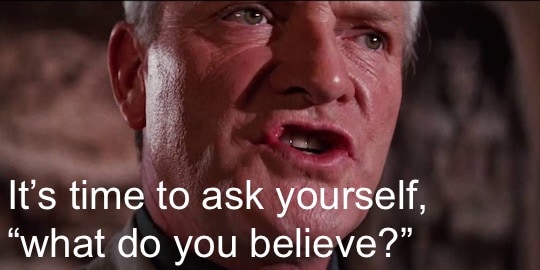Sales is hard for anyone, but especially when you start your own professional services business, your own beliefs are often the biggest obstacle to sales. I started with some strange, self-limited beliefs about sales.
Over time, I realized that I could actually sell more, while having more fun and less stress, without having to pretend to be someone else. Once I identified my own beliefs were the biggest sales obstacle I faced, I realized I was approaching everything backwards. I was covering up all the ways I could be helpful to people and trying to force myself to live up to the image of a sales rep that I hated. It seems really silly but it took me a while to figure this out. Hopefully you’ve already done it, but if not, this article may help you get there.
What we believe about sales
Consider how strongly you agree with the following statements:
- I hate pushy sales people.
- I’ve had bad experiences with sales people trying to sell me.
- I’ve had bad experiences with sales people selling something I then had to deliver for a client.
- Sales people aren’t trustworthy– they are looking out for their interests, not mine.
- Sales people will say anything to try to counter objections and get the sale.
If you’re anything like me, you probably agree with those statements. It’s easy to recall situations involving those kinds of sales reps from our own lives and from popular culture.

When I started my own business, that’s how I thought of sales. I knew I had to do sales, so I thought I had to act like that. I bought a bunch of sales books and tried to follow their advice. (In fairness, it wasn’t quite like Alec Baldwin.)
I thought sales required:
- Being extroverted.
- Convincing people to buy (“always be closing”).
- Convincing people to be interested in talking about buying.
- Being aggressive with people (“pushiness”).
What happened?
I was miserable. And awkward. Which made it very hard to sell anything, because who wants to buy from someone who is miserable and awkward? My own beliefs were the biggest sales obstacle– myths I had internalized about sales.
Alternative Beliefs
But what about other experiences? Times when a sales person helped and we left delighted with our purchase? It’s probably harder to recall these situations, because the sales person made it all about helping you.
This could be a waiter or someone helping you buy a shirt, to someone handling 8-figure enterprise deals. Imagine this person and see how closely these statements line up:
- They care about me and my results more than making the sale.
- They will tell me not to buy something that isn’t right for me.
- They are focused on my success and satisfaction after the sale more than the sale itself.
- They take time to understand my questions and objections and figure out the right solution.
- They are experts in their domain.
- They are honest and authentic.
Part of the reason it’s easier to recall negative experiences is because evolution has wired us that way. I would venture a guess that another reason is that when we have these experiences, we don’t feel like we’re being sold. Someone knowledgeable and caring helped us.
We can probably think of contrasting examples…
The annoying software sales rep who fits in the first category and we classify him as a “pushy salesperson.” The great sales rep who actually sells 10x as much software to your organization, but is always around, helping, is an “account manager” or “consultant” or “advisor”– at least in terms of your mental categorization.
I’ve talked to real estate agents who have tried to sell me on every house they showed me, and another agent who showed me dozens of houses (never be my real estate agent, I’m very picky) and then talked me out of buying a house I thought I wanted. Both are basically sales people, but which one do I classify as a “sales person”?
I’ve talked to financial advisors who seem right out of Glenngarry Glen Ross, with misleading sales scripts, and high pressure objection “handling”. And I’ve talked to financial advisors who lay out what they can do and what they can’t and what they think would be the right set up for us and why.
Believing in what lets you be yourself
Over the long term, people who put their customers first will generally make a lot more money. In fact, I will argue that they will be more successful in the short term, too. But perhaps most importantly, assuming you aren’t actually starving, is that the immediate impact of putting your customers first is that you get to help somebody better. For people who love serving, this is what we want to be doing. And it lets us be true to ourselves, rather than trying to pretend to be some kind of sales rockstar.
We can reframe “selling”, which we might consider making quota so we get paid (and if you’re doing the selling for your firm, you’re a quota-carrying sales person whether you like it or not) as “helping”, we can make a different set of statements.
- I help people do things that are important to them.
- Clients depend on me to do the right thing when I know more than they do about my area of expertise.
- I make a positive impact on my clients’ lives/businesses/etc.
- I get to earn a living doing what I love.
- I am always learning in my field and getting better at my practice. (They don’t call it a practice for nothing.)
- Clients enjoy working with me (and refer me to new clients)
If you identify with those statements, you have a very powerful internal mental foundation for sales. Because your prospects will interact with you as the “good” sales person who doesn’t even seem like a sales person. And you don’t have to act like a Glenngary sales person. You get to be you.
(Keep in mind, sales is a profession that requires training, skill, and practice. And most sales people are good people– we just get the bad ones stuck in our minds.)
When you think of sales as “helping”, you remove so much pressure. Prospects can sense your knowledge, enthusiasm, and conscientiousness. Conversations are fun, rather than awkward. Even if you don’t get the sale, you contribute by helping them work through a problem, or by referring them to someone who can. You know that have other prospects, so everyone gets a good vibe, even those who don’t buy or aren’t ready to buy now. (How many pushy sales reps did you call back, months or years later, saying, “I wasn’t ready then, but I really enjoyed talking with you, and I’m ready to start”? I’ll brag a little bit and say this happens to me.)
More than just “believe in yourself”
To help effectively, you still need discipline and process, just as a doctor has protocols for diagnosis and procedures. You need to know what kind of problems you can treat and which “patients” you should refer elsewhere, to save everyone a lot of time and energy. You need to know which questions to ask to qualify people and create proposals. (Having a good proposal template is essential for making sure you can ask the right questions to lay out the right story in the proposal.) You need to feel comfortable talking about business issues like budget, scope, timelines, approval, etc. (Here are some scripts for people who hate “selling” to help open conversations, transition social calls to sales calls– thanks David A. Fields— and more.)

And like any other practice, you need to borrow from the Nike marketing slogan and Just Do It. Don’t go out there and “sell”. All of your limiting beliefs about sales will make it painful (if you’ve read this far– if you’re someone who just loves sales, that’s great, but this article wasn’t for you). Go out and help.
Especially in these times when coming off as “sales-y” is worse than ever, but people need help more than ever…
